Health data boom heralds new era of personalised medicine
- Published
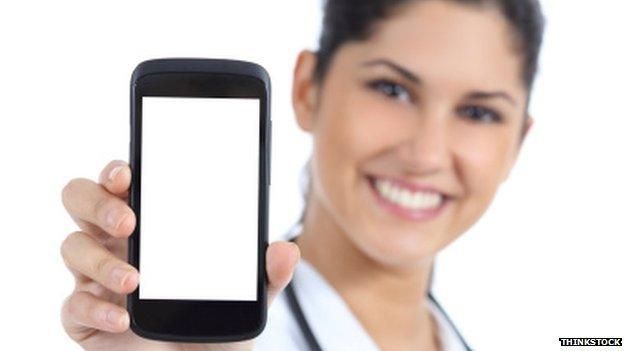
As more data is collected about us, smartphones will become like doctors in our pockets
We are moving from a world where we treat illnesses to one where we predict and prevent them, advised by mobile doctors in our pockets.
This new era of medicine is being driven by an explosion in health-related data from a growing range of public and private sources, analysed by increasingly powerful number-crunching computers.
And now that sequencing human genomes is getting faster and cheaper, the days of truly personalised healthcare are drawing closer.
Sweet spot
Combining public health records with all the new sources of health data generated by wearable devices, wi-fi enabled scales, smartphones and low-cost diagnostic kit, could provide a far more accurate picture of our health and the treatments we receive.
And the more hard evidence we have, the better the decisions we can make.
Take diabetes as an example. Nearly 350 million people worldwide have the disease, according to the World Health Organization, with about 50% of them likely to die from cardiovascular disease and stroke.
An obesity epidemic also means far more children are now succumbing to type-2 diabetes, the most common form of the disease.
Cheap blood glucose level testers, from companies such as Sanofi Aventis, can now be attached to smartphones and that data recorded and collated for analysis. This information can be combined with other data from exercise and diet apps to build up a more complete picture of patients' lifestyles.
"We're working with app and insulin pump providers to bring their data together with existing clinical data to allow patients to become much more involved in the management of their own care," says David Sibbald, chief executive of informatics company Aridhia.
"This has to happen if healthcare is to be affordable in future."
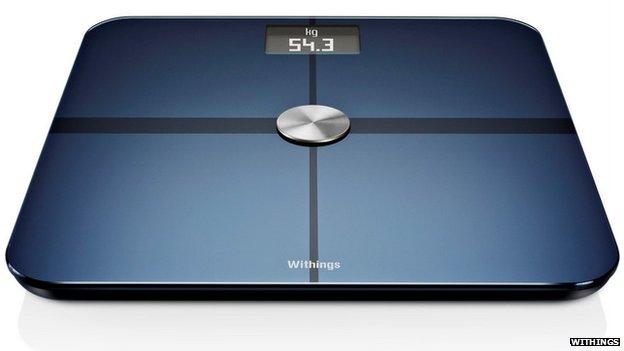
Wi-fi and Bluetooth enabled scales measuring weight, body fat, and heart rate are collecting vast amounts of health data about us
Matt Smith, northern European chief technology officer for SoftwareAG, believes improvements in smartphone sensors and mobile diagnostic kit will help health providers make earlier interventions.
"Say we've written an app that monitors your exercise and the phone's accelerometer detects a lot of movement - we could respond to that data in real-time and send a message suggesting you check your blood sugar level," he says.
"This kind of early intervention could prevent a paramedic having to come out and even save your life."
As more and more information is known about us, the more tailored our treatments will become, believes Wayne Parslow, European manager for US healthcare analytics company, MedeAnalytics.
"Soon we'll be carrying our own personalised health plans around with us," he says.
Care.data
Most medical experts agree that the digitalisation and sharing of anonymised medical records from GPs, hospitals and other sources could lead to significant improvements in how we run our health services and tackle disease.
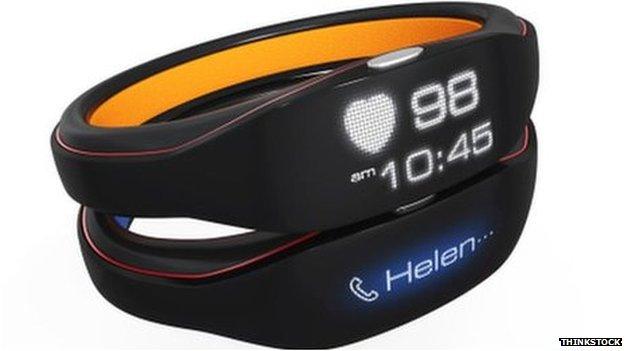
Fitness data might be used by our doctors to come up with better diagnosis and treatment
But bringing all these disparate data sets together and standardising them is a big challenge.
Dr Cliff Morgan, chief clinical information officer for the Royal Brompton and Harefield NHS Foundation Trust, told the BBC: "We're heading down the road to a completely digital health care record. But a lot of this data is in physically separated databases - there are about 400 in our hospitals alone - and so far we have brought 60% of these together into one clinical data warehouse."
Business analytics company SAS is handling the aggregation and anonymisation of the data, which can then be interrogated in new ways, says Dr Morgan.
"Analysing this mountain of data helps us discover correlations that weren't so obvious before, so we can begin refining the way we practise medicine and identify those who are statistically more likely to succumb to a particular disease," he says.
Hospitals can then allocate resources more efficiently and target smaller and smaller groups with almost tailor-made treatments.
"We'll be able to work out whether treatment A or B is better because we'll have live, fizzing statistics to back up the traditional wisdom and experience of doctors," he says.
Data sharing is key to such advances, but privacy concerns continue to dog progress. NHS England recently postponed its care.data project for six months to give the public more time to understand it.
Squeezing out inefficiency
As populations grow and people live longer, healthcare costs are growing to unsustainable levels. The NHS has been tasked with finding annual savings of £20bn by 2015.
Big data analytics can help squeeze inefficiencies out of the system.
For example, by looking a doctor's prescriptions for cholesterol-reducing statins across the country, Prescribing Analytics, a joint venture comprising NHS doctors, academics and tech start-ups, found that at least £200m a year could be saved if doctors switched from branded to cheaper - but equally effective - generic versions of the drugs.
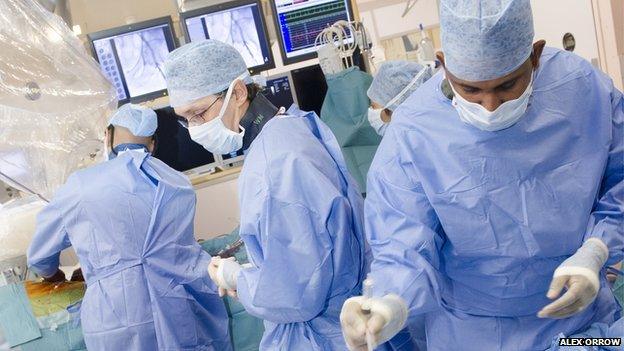
Data collection and analysis is helping hospitals use their resources more efficiently
Other research has suggested these savings could be increased to £1.4bn a year if the same approach was applied to a range of other commonly prescribed drugs.
Worldwide, individual hospitals are making better use of data to reduce emergency waiting times, track patient movements, moderate X-ray dosage levels, and generally manage resources more efficiently.
Mr Parslow says access to huge amounts of data is enabling companies such as his to develop predictive algorithms that can forecast which demographics are likely to cost the most to treat in future, for conditions like diabetes and asthma.
"This will help healthcare providers intervene earlier and redesign their services to cope with the expected massive increase in healthcare demand," he says.
Genomic medicine
Another exciting development is the combination of big data analytics and genomics to tackle diseases such as cancer, which is still resistant to about 75% of current treatments.
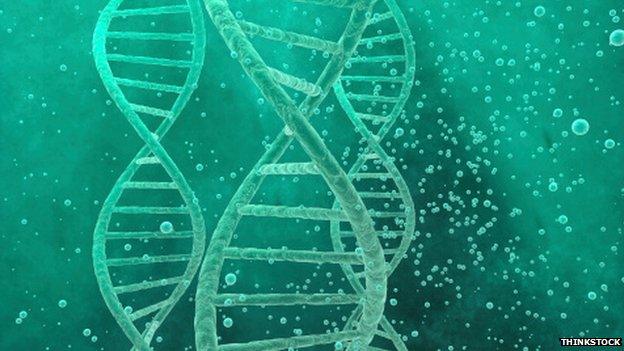
Genomics-based medicine could transform the treatment of diseases such as cancer
The human genome project - three billion base pairs of DNA first mapped in 2000 by Craig Venter and Dr Francis Collins - took 13 years at a cost of $3bn (£1.8bn). Now the latest DNA sequencing machines from the likes of Illumina can map a human genome in a day, potentially bringing the per-genome sequencing cost to under $1,000 for the first time.
Companies such as US-based MolecularHealth are getting close to predicting which cancer drugs are likely to be most effective for your genetic profile and your particular type of cancer.
Dr Werner Eberhardt, chief health platform expert at software company SAP, says: "By bringing gene sequencing and historical cancer treatment data together we're moving towards truly personalised healthcare."